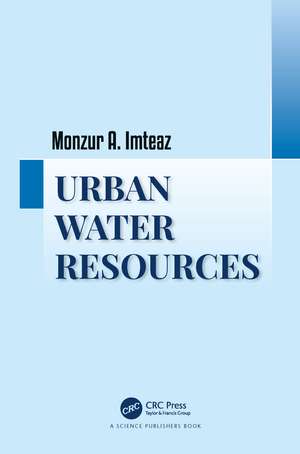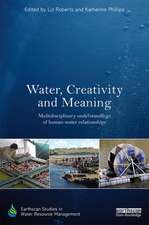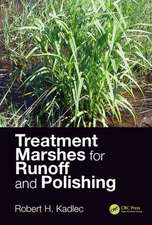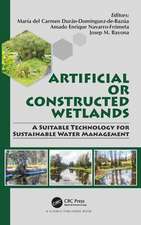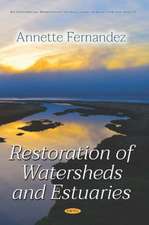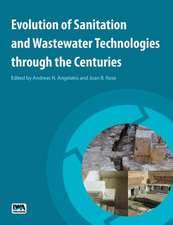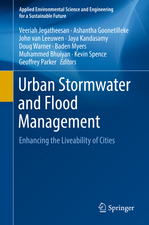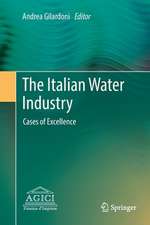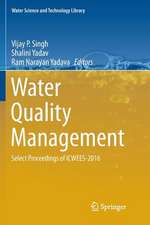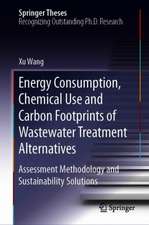Urban Water Resources
Autor Monzur Alam Imteazen Limba Engleză Paperback – 31 mar 2021
With the view to aiding the development of integrated urban water resources management strategies, this book endeavors to present and explain the major urban water cycle components from a single holistic platform. The book presents the introduction, analysis and design methods of a wide range of urban water components i.e., rainfall, flood, drainage, water supply and waste water with the additions of sustainability practices in most of the components. Current "Hydrology" and "Hydraulics" books do not incorporate sustainability features and practices, while there are many books on general "Sustainability" without integrating sustainability concepts into typical engineering designs.
The book starts with components and classifications of world water resources, then basic and detailed components of the hydrologic cycle, climate change and its impacts on hydrologic cycle, rainfall patterns and measurements, rainfall losses, derivations of design rainfalls, streamflow measurements, flood frequency analysis and probabilistic flood estimations, deterministic flood estimations, unit hydrograph, flood modelling, commercial modelling tools and use of Geographical Information System (GIS) for flood modelling, principles of open channel hydraulics, critical flow and flow classification indices, open channel flow profiles, uniform flow in open channel and open channel design, estimation of future population and domestic water demand, design of water supply systems, sustainable water supply system, water treatments, wastewater quantification, wastewater treatments, sustainable and decentralized wastewater treatment, stormwater drainage and urban drainage analysis, water footprint and water-energy nexus, features of water conservation, harvesting and recycling, components of sustainable urban design, stormwater treatment and integrated water management.
| Toate formatele și edițiile | Preț | Express |
|---|---|---|
| Paperback (1) | 338.14 lei 6-8 săpt. | |
| CRC Press – 31 mar 2021 | 338.14 lei 6-8 săpt. | |
| Hardback (1) | 1225.05 lei 6-8 săpt. | |
| CRC Press – 28 aug 2019 | 1225.05 lei 6-8 săpt. |
Preț: 338.14 lei
Preț vechi: 386.69 lei
-13% Nou
Puncte Express: 507
Preț estimativ în valută:
64.71€ • 67.31$ • 53.42£
64.71€ • 67.31$ • 53.42£
Carte tipărită la comandă
Livrare economică 15-29 aprilie
Preluare comenzi: 021 569.72.76
Specificații
ISBN-13: 9780367779276
ISBN-10: 0367779277
Pagini: 308
Dimensiuni: 156 x 234 mm
Greutate: 0.44 kg
Ediția:1
Editura: CRC Press
Colecția CRC Press
ISBN-10: 0367779277
Pagini: 308
Dimensiuni: 156 x 234 mm
Greutate: 0.44 kg
Ediția:1
Editura: CRC Press
Colecția CRC Press
Cuprins
Table of Contents:
Preface
Acknowledgements
About the author
Introduction
World Water Resources
Classifications of Water Resources
Climate and Climate Change
Seasonality Index
Drought Index
Hydrologic Cycle and Rainfall-Runoff Processes
Hydrological Cycle and Systems
Water Balance
Precipitation
Precipitation Measurement
Rainfall Variability
Evaporation and Transpiration
Catchment and Watershed
Abstraction and Losses
Runoff and Hydrographs
Streamflow Measurements
Rating Curve
Probabilistic Rainfall/Flood Estimation
Introduction to Flood Estimation
Terminologies used in Probability Analysis
Failure and Risk
Hydrological Data
Flood Frequency Analysis
Design Rainfall
Introduction
Intensity-Duration Relationship
Derivation of Design Rainfall
Temporal Pattern
Deterministic Flow/Flood Estimations
Introduction
Hydrograph Details
Rational Method
Time of Concentration
Non-Homogeneous Catchment
Partial Area Effect
Composite Catchment
Unit Hydrograph Method
Flood Modelling
Time-Area Method
Modelling Tools
Open Channel Hydraulics
Introduction
Principles and Equations
Effect of Streamline Position
Solutions of Energy Equation
Critical Depth Calculations
Froude Number
Applications of Energy Equation
Gravity Wave and its Applications
Uniform Flow in Open Channel
Flow Classifications
Uniform Flow Equation
Solutions of Manning’s Equation
Details of Manning’s Roughness
Compound Channel
Conveyance of Open Channel
Design of Uniform Flow Channel
Hydraulic Modelling
Introduction
Solution Process
Data Requirements
Hydraulic Modelling using HEC-RAS
Water Supply Systems
Introduction
Water Consumption Pattern
Estimation of Demand
Water Supply System Components
Storage Tank Sizing
Pipe System Analysis and Design
Water Quality
Water Treatment Processes
Water Quality Measurement and Calculations
Settling of Particles in a Fluid
Sedimentation Basin Sizing
Wastewater Systems
Introduction
Wastewater Collection System
Quantification of Wastewater
Quality of Wastewater
Wastewater Treatment
Disinfection, Sludge Treatment and Disposal
Sustainable Wastewater Treatment and Recycling
Stormwater Drainage
Introduction
Components of Urban Stormwater Drainage
Design Calculations and Equations
Hydraulic Grade Line (HGL) Analysis
Onsite Detention (OSD) Tank
Urban Drainage Analysis
Pit Location Design and Bypass Flow
Overland Flow path
Water Conservation and Recycling
Introduction
Water Footprint
Sustainable Water Fixtures
Stormwater Harvesting
Greywater Recycling
Centralised Recycled Water
Water Sensitive Urban Design
Introduction
Grass Swale
Sand Filter
Bioretention System
Porous Pavement
Sedimentation Basin
Wetland
Riparian Vegetation
Rainwater Tank
Appendix A Manning's ‘n’ values for Channels (Chow,
Preface
Acknowledgements
About the author
Introduction
World Water Resources
Classifications of Water Resources
Climate and Climate Change
Seasonality Index
Drought Index
Hydrologic Cycle and Rainfall-Runoff Processes
Hydrological Cycle and Systems
Water Balance
Precipitation
Precipitation Measurement
Rainfall Variability
Evaporation and Transpiration
Catchment and Watershed
Abstraction and Losses
Runoff and Hydrographs
Streamflow Measurements
Rating Curve
Probabilistic Rainfall/Flood Estimation
Introduction to Flood Estimation
Terminologies used in Probability Analysis
Failure and Risk
Hydrological Data
Flood Frequency Analysis
Design Rainfall
Introduction
Intensity-Duration Relationship
Derivation of Design Rainfall
Temporal Pattern
Deterministic Flow/Flood Estimations
Introduction
Hydrograph Details
Rational Method
Time of Concentration
Non-Homogeneous Catchment
Partial Area Effect
Composite Catchment
Unit Hydrograph Method
Flood Modelling
Time-Area Method
Modelling Tools
Open Channel Hydraulics
Introduction
Principles and Equations
Effect of Streamline Position
Solutions of Energy Equation
Critical Depth Calculations
Froude Number
Applications of Energy Equation
Gravity Wave and its Applications
Uniform Flow in Open Channel
Flow Classifications
Uniform Flow Equation
Solutions of Manning’s Equation
Details of Manning’s Roughness
Compound Channel
Conveyance of Open Channel
Design of Uniform Flow Channel
Hydraulic Modelling
Introduction
Solution Process
Data Requirements
Hydraulic Modelling using HEC-RAS
Water Supply Systems
Introduction
Water Consumption Pattern
Estimation of Demand
Water Supply System Components
Storage Tank Sizing
Pipe System Analysis and Design
Water Quality
Water Treatment Processes
Water Quality Measurement and Calculations
Settling of Particles in a Fluid
Sedimentation Basin Sizing
Wastewater Systems
Introduction
Wastewater Collection System
Quantification of Wastewater
Quality of Wastewater
Wastewater Treatment
Disinfection, Sludge Treatment and Disposal
Sustainable Wastewater Treatment and Recycling
Stormwater Drainage
Introduction
Components of Urban Stormwater Drainage
Design Calculations and Equations
Hydraulic Grade Line (HGL) Analysis
Onsite Detention (OSD) Tank
Urban Drainage Analysis
Pit Location Design and Bypass Flow
Overland Flow path
Water Conservation and Recycling
Introduction
Water Footprint
Sustainable Water Fixtures
Stormwater Harvesting
Greywater Recycling
Centralised Recycled Water
Water Sensitive Urban Design
Introduction
Grass Swale
Sand Filter
Bioretention System
Porous Pavement
Sedimentation Basin
Wetland
Riparian Vegetation
Rainwater Tank
Appendix A Manning's ‘n’ values for Channels (Chow,
Recenzii
"Imteaz (Swinburne Univ. of Technology, Melbourne) provides a concise text that combines hydrology with applications such as design for drainage, drinking water supply, and wastewater treatment systems. While the subject matter treatment is mostly standard, it is especially well done here and supported by numerous mathematical examples. The design of water and wastewater treatment plants falls somewhat outside the scope of this book, yet it is covered, again in a concise rather than comprehensive way. In particular, little is said here about water quality. This book is about water quantity—getting water, storing it, moving it, and removing it. For these purposes, it provides a nice summary. The earlier chapters are relatively more comprehensive: they cover hydrology, probabilistic rainfall descriptions, flood prediction, and open channel flow. The author's intent is to integrate considerations of sustainability, and this purpose is well served in opening chapters addressing climate change, droughts, and rainfall variability. The final chapters discuss water conservation and recycling, and feature brief descriptions of “green infrastructure” approaches. Overall, this book is appropriate as an introductory text for undergraduates or for working professionals who want to learn some of the basics of this field."
— D. A. Vaccari, Stevens Institute of Technology, CHOICE, June 2020 Vol. 57 No. 10
— D. A. Vaccari, Stevens Institute of Technology, CHOICE, June 2020 Vol. 57 No. 10
Descriere
The book provides an overview of the urban water components, design concepts and steps of different urban water components, water sustainability and how it can be achieved through an integrated urban water management concept, modern modelling tools for the assessments of different components of urban water system.
